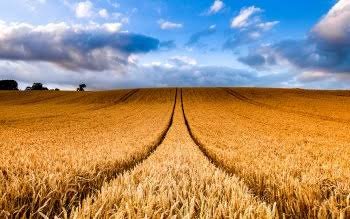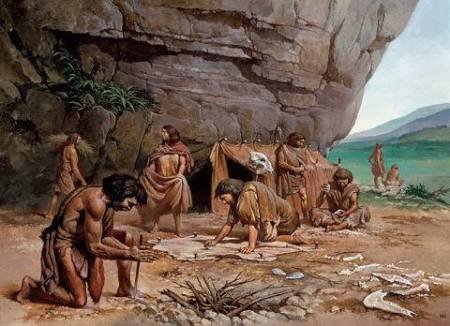How wheat domesticated humans: A tale of tragedy and poor nutrition :)

2.5 million square kilometers of our planet is covered with wheat; That's about 9 times the size of Britain, give or take.
Let's go back to the year 10,000BC: Homo sapiens were spreading like a plague across the world, and Neanderthals were in decline. (Eventually Sapiens killed them off completely). Rather than climb trees for fruits, dig for roots and pluck berries sapiens spent more time cultivating wheat (and other grains over some millennia) thinking it would provide them with a more plentiful source of food. (They domesticated animals also of course, for the same reasons). Here's an image of some poor Neanderthals who were wiped out by Sapiens.

Increasing numbers of hunter-gatherers spent more and more time cultivating and caring for their wheat. Due to the time it takes wheat to grow they were forced to remain fixed in a place for lengthy periods and rather than transitioning from area to area following food and growth cycles they were planted in one place, like their wheat. From a generally comfortable life of hunting and gathering humans now spent long hours, dawn to dusk, taking care of wheat.
Wheat was a brutal master too. Demanding.
It didn't like rocks: So humans cleared fields with back-breaking work. Wheat was selfish too. It didn't like sharing space or nutrients with other plants: Humans spent all day toiling removing weeds. Wheat was thirsty: Humans carted water or dug canals to irrigate it. Wheat got sick also: So humans kept a look out for worms and blight. Wheat was attacked: Humans stood guard against rabbits and locusts, built fences. Wheat also compelled humans to collect manure from other animals to enrich the ground in which it grew. What the?!
The Homo sapiens body was not equipped or evolved for such work. It had evolved to climb and run, not carry water and clear rocks. Humans began to develop hernias, back aches and slipped-discs.
So, wheat...In our hubris we feel we domesticated it...But did we? The word domesticate derives from the Latin, domus meaning house. But who lives in the house, wheat or Homo sapiens, us. Us of course.
And now 90 percent of the calories that we intake come from only a handful of plants "domesticated" by our ancestors: Wheat, rice, maize/corn, barley and potato. Rather than rely on a wide variety of foods like a good omnivourous ape should we rely on a diet low in vitamins and minerals which is hard to digest and bad for teeth and gums.
Chalk up one for wheat and zero for humans.
Information garnered from the Yuval Noah Harari book: Sapiens
Images:
wall.alphacoders.com/by_sub_category.php?id=168681
google.com.au/amp/s/www.pinterest.com/amp/pin/425660602256156057/
When are you going to come and post for us at Community News Galen? You can head up your own National Geographic style division.
COMMUNITY NEWS
How would a simple bloke like me achieve such a task? Please verse me in the ways...
Check out what we are doing over at #communitynews mate - steeming in real news on designated accounts - think about what you might like to post about and if interested I will help you set up a new account - I am trying to ensure that all accounts earn at least $2 per post - 1 post per day 3-7 per week.
Will check it out. Just landed from Singapore so once I'm caught up at work etc. I take a look. Thanks. :)
Nice view
That was a great post, makes the argument for a keto diet.
Sure does. It's difficult in our society to avoid grains and cereals. It's probably even worse these days because we're not actually eating wheat, potatoes, corn etc. We're eating a genetically modified thing that used to be wheat, potatoes or corn mainly because we don't like the look of the natural version or it's too costly to produce. Furthermore it provokes thoughts on our modern way of life in comparison to the relatively easy lifestyle of a hunter-gatherer. But then again there's too many people for that way of life these days. Maybe a population cull is in order. Say, 80%? Just thinking out loud of course.
The cultivation of wheat and other crops is one of the reasons behind the genocide of the native Americans by the Europeans in the 1700s and 1800s. The farmers needed the land that the native Americans used for their hunting and gathering. Grain cultures tend to be imperialist in nature.
Homo sapiens wiped out Neanderthals also and thousands of other species as well. It’s in our nature. Give us enough time (less than you think probably) and we’ll wipe ourselves out. You or I won’t be here to see it, but it’s coming. The planet will rejoice.
Eating organic non GMO wheat and older heritage varieties is better than any of the modern wheat varieties. Modern wheat has been hybridized to have a high gluten content because the high glutin content is easier to bake with. Spelt, a very old variety of wheat, has a low gluten content and doesn't rise very well when using bread yeast, but it has more nutritional value then modern wheat.
It's the same with corn, heirloom maise has more nutritional value than any modern GMO corn.
This post received a 20% vote by @mrsquiggle courtesy of @scooter77 from the Minnow Support Project ( @minnowsupport ). Join us in Discord.
Upvoting this comment will help support @minnowsupport.